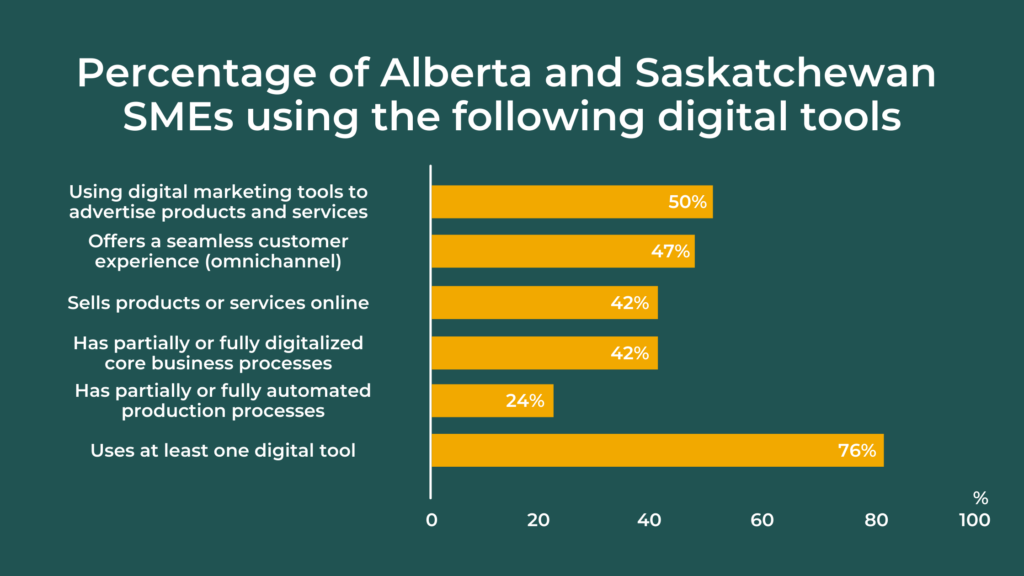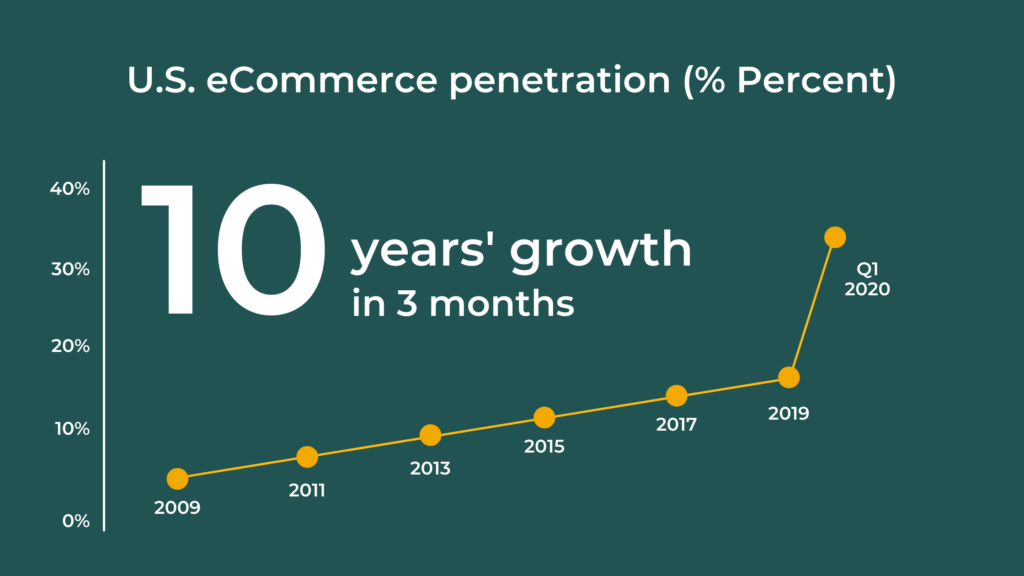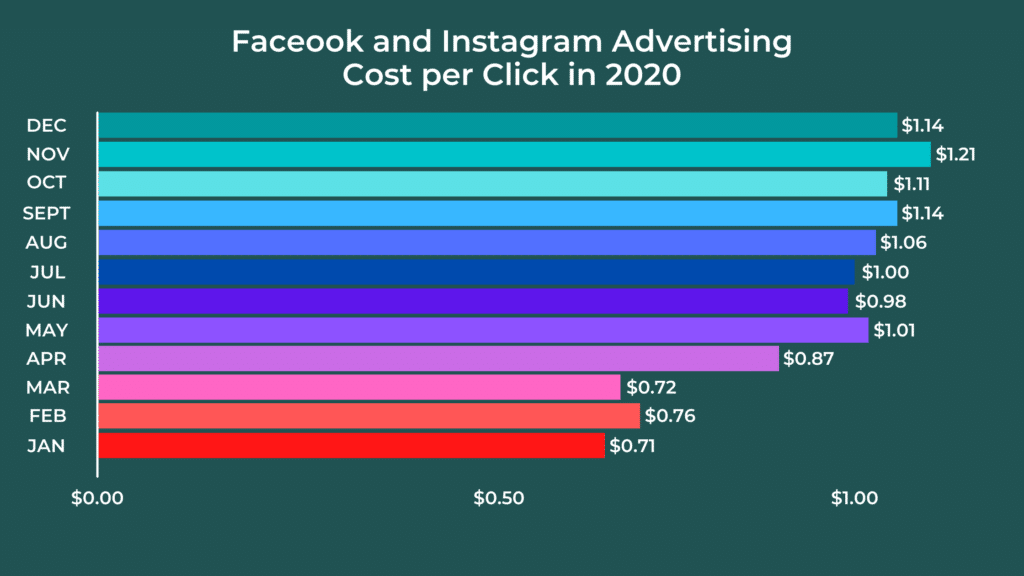With the pandemic creating difficulties for people to interact face-to-face, at minimum businesses should transition a portion of their operations online. The shift has been so pronounced that global ecommerce has spiked during the latter half of 2020 and will continue to do so. Having an online store front may not be enough. Conducting online transactions, having an omnichannel strategy, and providing fast consistent fulfilment is the new playing field.
SME Digital Spend Before COVID-19
In 2019, only 4 out of 10 Canadian SMEs had an online presence. Medium-sized businesses and small businesses reported 34% and 23% online sales, respectively. As shown by the figure below, businesses who did not have an online presence cited “no need” as the main reason. Prior to COVID, businesses that did not rely on the internet would not even consider going digital. That may seem shocking now that almost everything happens online.

As shown by the figure below, in 2019 most SMEs invested mostly in a company website and social media account when going digital. A small fraction, roughly a fifth or less, had platforms that allowed for transaction online.


Digital Push After the Lock-down
Sentiments toward going digital have changed and are now perceived as mandatory with social distancing and lockdown rules in effect. According to a survey published by the Canadian Federal of Independent Businesses (CFIB) in the summer of 2020, 18% of SMEs engaged in ecommerce prior to COVID and since then, another 15% of SMEs followed suit.
For most businesses, going digital begins with developing an online presence. In other words, start by creating a company website and social media account. Another survey of 500 SMEs conducted in Alberta and Saskatchewan shows that most SMEs invested in using digital advertising tools and applying multiple online channels to increase sales and customer experience.

For 2021, 51% of business owners believe that they will need further rely on digital communications. This is echoed by Shopify, the Canadian ecommerce giant, who notes that customer acquisition costs are rising and suggests SMEs to focus on building strong connections to support customer retention. While there is increasing interest for businesses to become digital, it is also worth noting that a lot of owners are struggling to manage their digital platforms and channels. 46% of business owners are overwhelmed by having to keep track of too many digital channels. Omnichannel is important but requires support to be effective. Omnichannel is a type of retail that integrates the different methods of shopping available to consumers (e.g., online, in a physical store, or by phone). As a result, provinces like Ontario have stepped in to provide funding and programs that reduce the barriers to entry. Through organizations like Digital Main Streets, businesses are able to get the funding and expertise needed to achieve digital transformation. In British Columbia, a similar program named Launch Online was announced on February 3, 2021.
Having an online store front and social media may not be enough. There is strong case to start conducting transaction and fulfilment online. During the pandemic, U.S. ecommerce grew the same in just 3 months as it had 10 years before. It’s not just Gen Z and millennials driving this trend – older shoppers have also moved online.

Another metric to highlight how much investment is happening online is by looking at the amount of digital advertising spend. As shown in the figure below, cost per clicks (CPC) jump during the lock-down and continue to rise.

Government Programs to Get Online
In the fall of 2020 provincial governments announced programs to enhance digital strategies especially for small and medium sized businesses. As mentioned above, Digital Main Streets was created for Ontario, while in British Columbia two programs came out and are available as of this writing. The first, Small and Medium Sized Business Recovery Grant and the second, Launch Online.
Since we are in British Columbia, we will highlight the Recovery Grant and Launch Online programs. Both have similar eligibility requirements like registration and ownership in BC, pays taxes in BC, employs 149 or less people, and is still in operation.
Most of the actions for the Recovery Grant is about creating a digital presence (a website, search engine optimization and social media). This grant also helps the heavily impacted tourism industry. Sectors such as transportation, short-term accommodation, food and beverage services, entertainment, and travel.
Just like people are adapting to the pandemic, the Recovery Grant program has evolved but mainly due to criticisms by many stakeholders such as small business owners and the Canadian Federation of Independent Business. Since announcement in October 2020, only $12M of the $300M earmarked for the Recovery Grant program had been delivered to business owners as of February 3, 2021. To address this issue, for instance, the program’s qualification has changed from a 50% drop in revenue to just 30% drop.
The Launch Online program can provide an additional $7,500 non-repayable grant to create transaction systems for BC made products. This latter program has been approved for $12M in funding, meaning 1,500 businesses can access this grant if they make and sell BC products and want to transact online.
Contact your trusted financial professional and apply today before the deadline or before allocated funding runs out. The Small and Medium Sized Business Recovery Grant deadline is March 31, 2021. As of this writing, the Launch Online program is “open until the funds have been fully subscribed.”
Why Work with Purpose CPA?
If you do not have an online presence, start with some kind of web profile (Google store front or a templated webpage) and some social media right away. If you already have these enhance your brand by building omnichannel strategies to engage and retain different customers with a mix of product lines, provide fast and reliable fulfilment, and actively monitor market changes with regular analytics. What some may call an omnichannel or multichannel strategy – connect the major value driving parts to deliver products and services to your customer.
We at Purpose CPA are a digital first firm. We operate primarily online and help our clients do just the same. Talk to us today to learn how to access these grants and start transacting online.
Enjoyed this article? Here are some other reads you might also like:
REFERENCES
-
Statistics Canada, 2020, https://www150.statcan.gc.ca/n1/daily-quotidien/201123/dq201123a-eng.htm
-
Source: https://www150.statcan.gc.ca/t1/tbl1/en/tv.action pid=2210011901&pickMembers%5B0%5D=2.1&pickMembers%5B1%5D=3.2
-
https://www150.statcan.gc.ca/t1/tbl1/en/tv.action?pid=2210012001&pickMembers%5B0%5D=2.1&pic kMembers%5B1%5D=3.3
-
https://www150.statcan.gc.ca/t1/tbl1/en/tv.action?pid=2210012001&pickMembers%5B0%5D=2.1&pic kMembers%5B1%5D=3.2
-
The Globe and Mail, 2020 https://www.theglobeandmail.com/business/adv/article-as-e-commerce expands-small-businesses-need-to-boost-their-digital/
-
CFIB, 2020, https://www.cfib-fcei.ca/en/media/news-releases/half-small-businesses-saydigitalcommunication-will-be-even-more-vital-2021
-
Shopify, Future of Ecommerce 2021, https://www.shopify.ca/enterprise/the-future-ofecommerce/customer-retention
-
Revealbot blog https://revealbot.com/blog/facebook-advertising-costs/
-
Digital Main St. https://digitalmainstreet.ca/ontario/
-
Province of BC, StrongerBC https://www2.gov.bc.ca/gov/content/economic-recovery/business-recovery-grant
-
Province of BC and Alacrity Canada https://www.launchonline.ca/
-
Vancouver Sun, “B.C.’s e-commerce grant program fails to fill gaps left by ‘disastrous’ business recovery program: critics“ https://vancouversun.com/business/bc-grant-program-fails-to-fill-gaps-for-small-businesses




